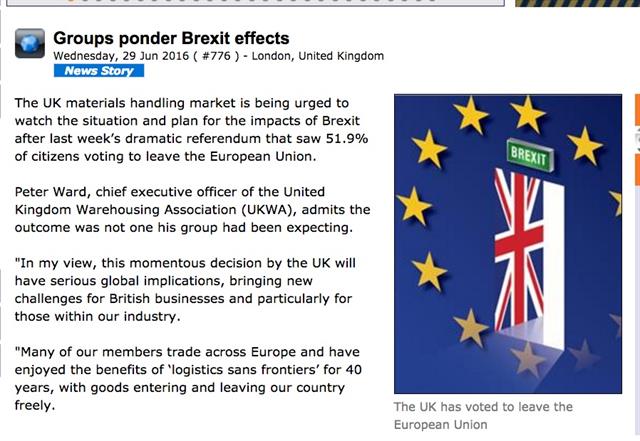 Forkliftaction News coverage of Brexit reaction |
Three weeks on from the UK's decision to quit the European Union, forklift manufacturers, exporters and importers are taking a wait-and-see approach.
Martin McVicar, managing director of Combilift, says as his head office and manufacturing facility is based in the Republic of Ireland, "this is definitely not the result that Combilift would have wanted".
McVicar says that while it's business as usual with private businesses continuing to place orders, "we have already had evidence that larger public concerns that are not manufacturing-based and who have also seen their share price slump are putting decisions on hold for the time being".
Hans-Georg Frey, chairman of the board of management of Jungheinrich AG, also regrets the Brexit decision, but says "the referendum alone is a far cry from the implementation of the exit".
"Now, negotiations must be conducted to establish how best to implement the exit for everyone involved."
Frey believes Jungheinrich will not suffer "any major shortcomings for the time being, as we have hedged currency for 2016 and do not have any major manufacturing sites in the United Kingdom. The extent to which potential changes, such as a rise in import prices, will impact business remains to be seen. We currently classify the risk we bear as low."
He tells
Forkliftaction News that in 2014, UK revenues made up about 9% of Jungheinrich's net sales. Half of this was accounted for by new truck business (materials handling equipment imports) and half was accounted for by used equipment, rentals and service which would not be affected by the exit.
For France's Haulotte group, Brexit will have "limited impact on the global business", according to corporate communication manager Carine Ploton. However, she does have concerns for the impact on the UK economy "and thus on the UK aerial work platform market" as well as the effects on currency.
Roberto Bigliardi, spokesman for Italy's Dieci, doesn't believe that Brexit will affect the global turnover of the group, but notes that "there will definitely be repercussions for British purchasers".
"A machine manufactured in another European country will certainly become more expensive for them," he warns.
McVicar notes that his company has been "sourcing more raw materials from UK suppliers and also using more UK-based subcontractors," so Combilift won't feel the currency fluctuations so much for its Pound Sterling purchases. At the same time, "the weaker Pound will boost exports from the UK and we're confident that we will see growth in the manufacturing sector. As a supplier to the manufacturing sector, we expect to see more demand for our products.
"We are confident that the current uncertainty will be short-lived and we will continue to put resources as planned into the UK which is our biggest single export market. Our long-term focus on this market remains steadfast," he stresses.
In similar vein, Haulotte's Ploton also anticipates a negative initial impact due to the devaluation of the British Pound, "but we believe that the situation will tend to return to normal; in the worst case, in a couple of years".
Dieci's Bigliardi remains philosophical: "In Italy, we have an ancient proverb that says: 'The devil you know is better than the devil you don't know.' We would have preferred that everything remained as it was ..."